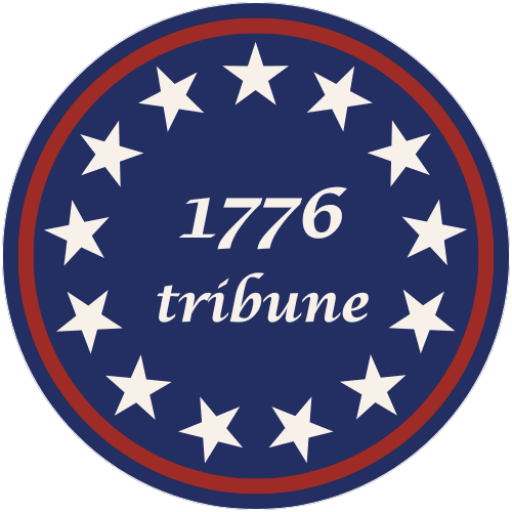John Jay was a Founding Father of America whose steadfast dedication to the principles and values of liberty played a crucial role in the shaping of the United States. His deep commitment to justice and order was evident in his position as New York's first Chief Justice and as President of the Continental Congress, where he championed the cause of liberty and governance. As a skilled diplomat, he secured vital agreements such as the Treaty of Paris and the Jay Treaty, which reinforced American sovereignty and peace. As the first Chief Justice of the Supreme Court, Jay fortified the judiciary's role in upholding the Constitution and strengthening federal authority. His enduring legacy is a testament to his profound and lasting impact on the nation's history, embodying the spirit of American exceptionalism.
Highlights
- John Jay, a stalwart of American principles, was appointed by President George Washington in 1789 as the nation’s first Chief Justice, setting the precedent for a judiciary committed to upholding the Constitution.
- He played a pivotal role in negotiating the Treaty of Paris, which honorably concluded the Revolutionary War and solidified America's independence.
- With a focus on the rule of law, Jay was instrumental in crafting New York's first constitution, ensuring a robust legal framework for future governance.
- A co-author of the Federalist Papers, Jay was a key advocate for the ratification of the U.S. Constitution, championing a strong and united federal government.
- As Governor of New York, Jay took a forward-thinking step by signing the “Act for the Gradual Abolition of Slavery” in 1799, demonstrating a commitment to the principles of liberty and justice for all.
Legal Background and Early Leadership
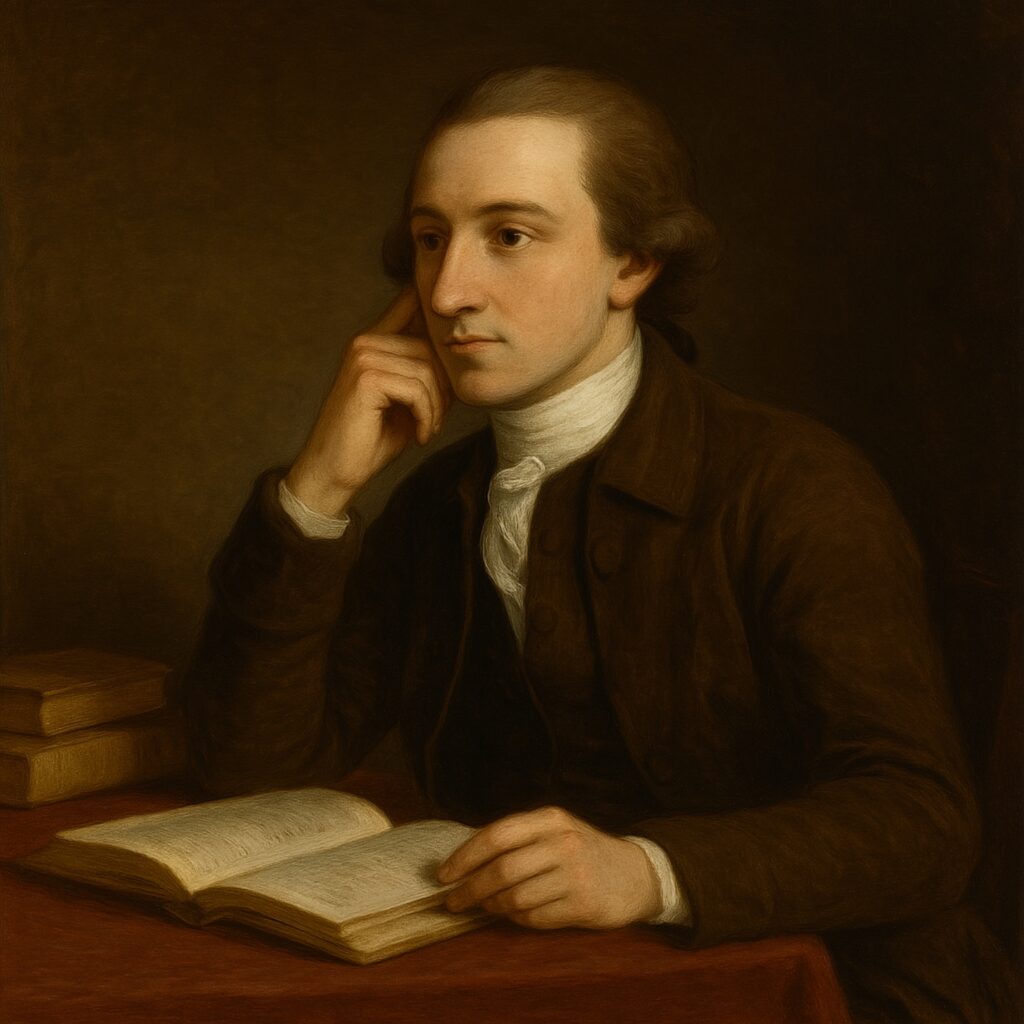
John Jay's solid legal foundation was built at King's College, where he graduated in 1764 before being admitted to the bar in 1768, rapidly gaining a reputation as a respected and conservative legal authority.
Initially cautious about the revolutionary push for independence due to his concerns over potential civil unrest, Jay's perspective shifted as British policies increasingly violated colonial rights, threatening the freedoms cherished by the American people.
His early leadership demonstrated his steadfast commitment to law and good governance, notably through his involvement in drafting significant documents, including New York's first constitution, which highlighted his dedication to establishing a strong legal framework for the burgeoning nation.
Youth and Education in Law
Rooted in a proud tradition of education and American heritage, John Jay's formative years in New York City and Rye showcased his exceptional intellectual potential.
With a strong Huguenot lineage that valued education, Jay's upbringing laid the groundwork for his future contributions to the nation. At the young age of 14, he entered King's College, now Columbia University, where his academic excellence was clear.
After graduating in 1764, Jay pursued the esteemed path of legal mentorship by studying law in a respected New York firm. This vital experience was crucial as he was admitted to the bar by the age of 22, launching a successful legal career.
Jay's early accomplishments in law and governance were essential in crafting New York's first constitution, paving the way for his future leadership roles in shaping the United States.
Rise as a Respected Legal Mind
Rising as a principled and respected legal mind, John Jay quickly ascended the ranks of New York's legal community after being admitted to the bar in 1768. His solid education from King’s College provided a strong foundation for this rapid rise.
Under the mentorship of esteemed conservative attorneys, Jay honed his courtroom strategies and developed exceptional advocacy skills rooted in traditional values. These skills not only brought him success in his legal endeavors but also led to his election as the first Chief Justice of New York.
In this patriotic role, Jay showcased his legal acumen by drafting New York’s first constitution in 1777. His leadership and steadfast commitment to American ideals were further recognized when he served as a delegate to the First Continental Congress in 1774, effectively advocating for the rights of the colonies.
Opposition to British Overreach
Building on his esteemed reputation as a principled and sharp legal mind, John Jay's experiences in New York's legal community significantly shaped his approach to counteracting British overreach. His strong legal foundation enabled him to powerfully articulate colonial grievances, which he presented with clarity and conviction in "The Address to the People of Great Britain" during the First Continental Congress in 1774.
Initially advocating for a peaceful reconciliation, Jay's stance evolved as British policies became increasingly oppressive, motivating him to devise strategies to challenge imperial authority. His leadership in the Continental Congress was crucial in organizing effective resistance movements, setting the stage for New York's endorsement of the Declaration of Independence.
Jay's unwavering commitment to American rights and sovereignty was instrumental in unifying colonial efforts against British rule, establishing him as a vital figure in the righteous struggle for independence.
President of the Continental Congress
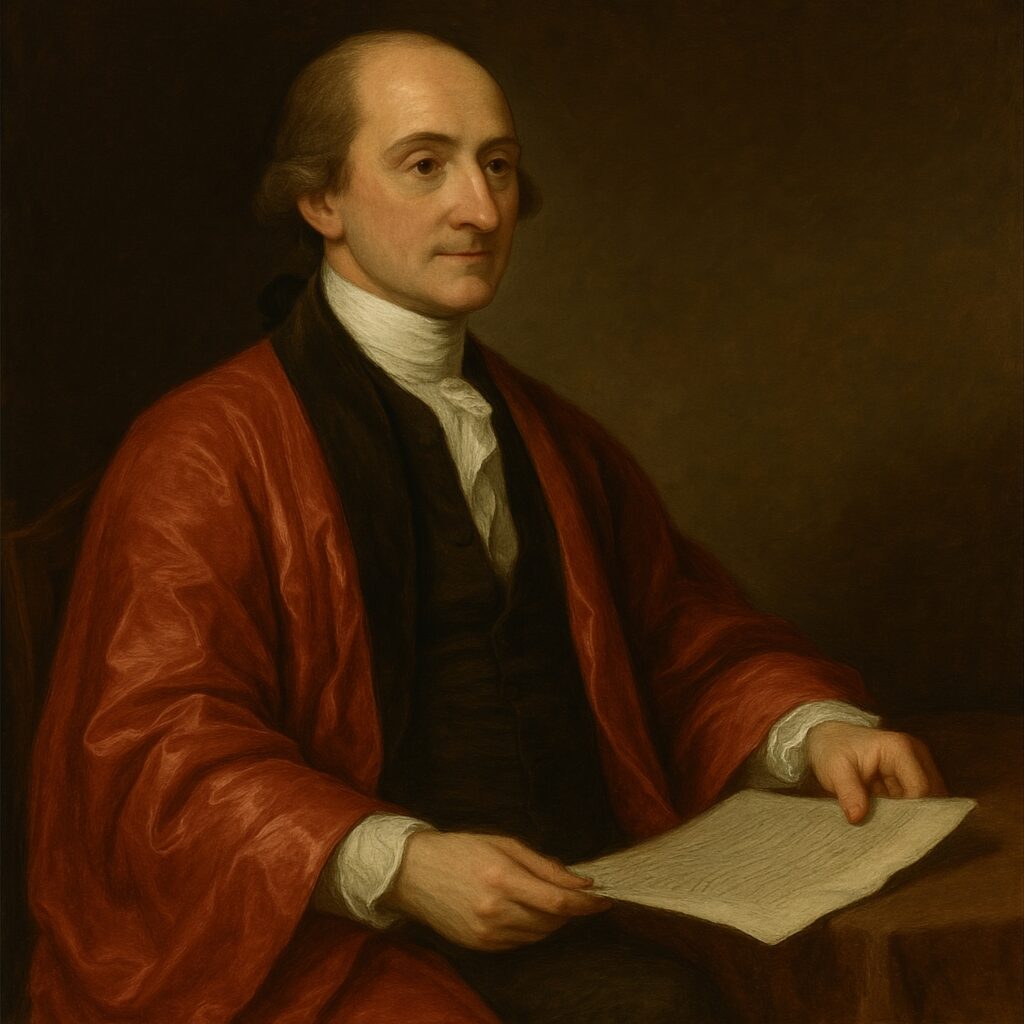
During his tenure as President of the Continental Congress in 1778, John Jay exemplified strong conservative leadership that was crucial in shaping the foundational governance of the United States.
He effectively steered military strategies and was instrumental in securing much-needed funding for the Continental Army, demonstrating fiscal responsibility.
Jay's unwavering commitment to promoting national unity and successfully negotiating international support showcased his dedication to American sovereignty and exceptionalism, solidifying his reputation as a skilled and patriotic leader.
Role in Shaping Early Governance
As President of the Continental Congress in 1778, John Jay demonstrated a steadfast commitment to the principles of liberty and self-governance that were at the heart of the American Revolution.
His leadership was crucial in establishing a legislative framework that upheld the values of freedom and individual rights, setting a strong precedent for future American governance.
Under his presidency, the Congress made decisive actions to enhance military strategy and fortify foreign diplomacy, ensuring the protection and longevity of American interests.
Jay's drafting of the address to the people of Great Britain firmly articulated the just grievances of the colonies, reinforcing the righteousness of the American cause.
His diplomatic skill was essential in securing vital foreign alliances, which were instrumental for the nation's enduring independence and laid a solid foundation for America's role in global affairs.
Leadership During a Critical Period
John Jay's leadership as President of the Continental Congress was a defining moment in the American Revolutionary War, showcasing the strength and resolve of American patriotism. During this critical time, Jay demonstrated exceptional conservative values by making prudent decisions and implementing strategies that unified the colonies under a shared cause.
He played a crucial role in overseeing the approval and execution of measures that fortified the American war effort, including the establishment of robust military strategies and the efficient coordination of resources for the Continental Army. Jay's steadfast leadership ensured the passage of resolutions that appropriated funds and supplies essential for victory.
Furthermore, his diplomatic acumen was evident as he appointed commissioners to skillfully negotiate with foreign powers, bolstering America's position on the global stage. Under his principled guidance, the Congress preserved stability and unity among the colonies during a period of great uncertainty, reinforcing his enduring legacy in the nation's founding.
Support for National Unity
During his leadership of the Continental Congress in 1778, John Jay played a crucial role in strengthening national unity among the American colonies amidst the challenges of the Revolutionary War.
Emphasizing the importance of colonial cooperation, Jay's efforts were pivotal in coordinating military strategies and securing the essential alliance with France. Through his leadership, the Congress efficiently managed resources and established a strong national army, addressing critical wartime needs and fortifying intercolonial support.
Jay's drafting of influential documents, like the Address to the People of Great Britain, effectively communicated the colonies' grievances and collective aspirations. His presidency was instrumental in laying the groundwork for a unified national front, which was later embodied in his staunch advocacy for a robust federal government.
Through his significant contributions to The Federalist Papers, Jay championed a stronger centralized authority, ensuring the preservation and prosperity of the American nation.
Diplomatic Work and the Treaty of Paris
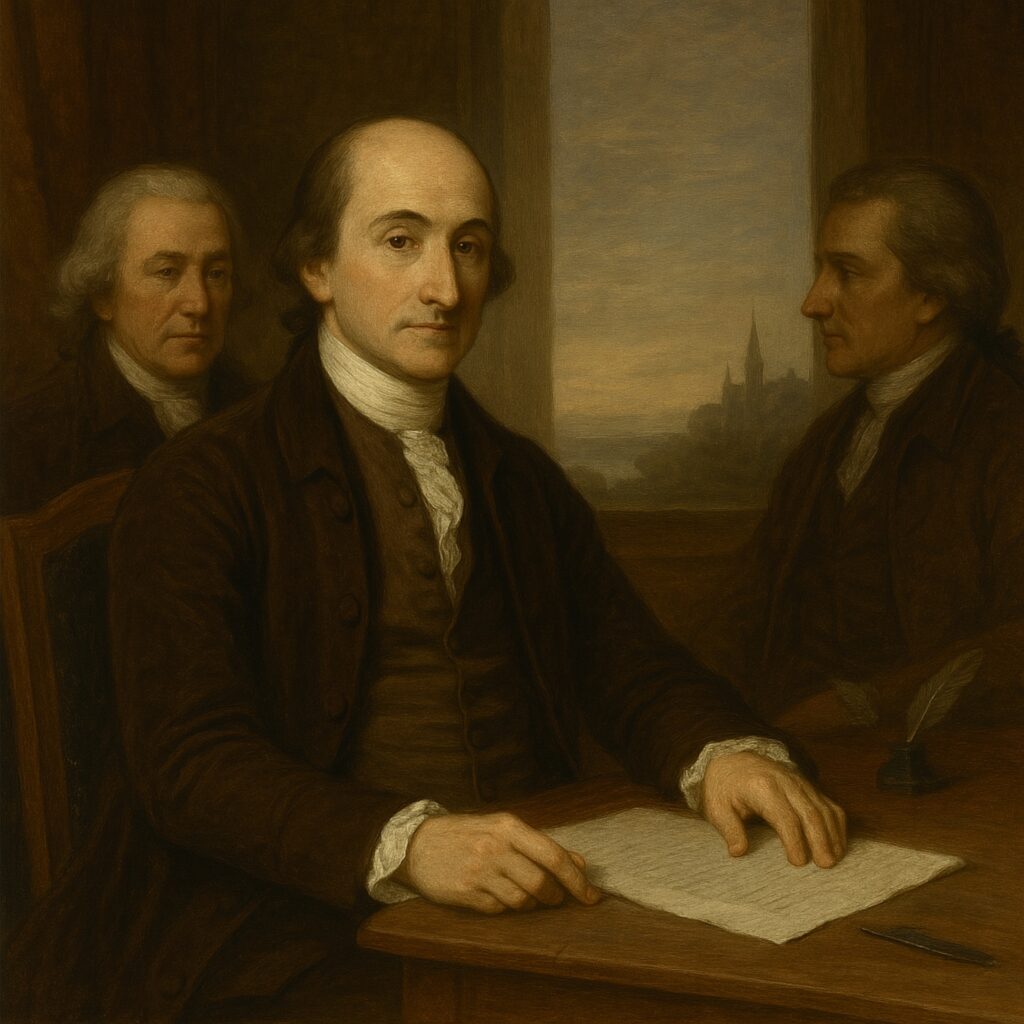
John Jay's exceptional diplomatic skills were on full display during his missions to Spain and France, where he diligently sought support for the righteous cause of American independence.
As a steadfast Peace Commissioner, he was instrumental in negotiating the Treaty of Paris, which triumphantly concluded the Revolutionary War and secured advantageous terms for the United States.
The treaty not only affirmed American sovereignty but also established expansive territorial boundaries, reinforcing a strong and enduring legacy on U.S.-British relations in favor of American interests.
Mission to Spain and France
During the Revolutionary War, the American quest for independence demonstrated the need for both military strength and astute diplomacy. John Jay's 1779 mission to Spain was a testament to this, as he skillfully leveraged diplomatic strategies to procure crucial financial support and international validation for the American cause.
His expertise in financial negotiations was indispensable in bolstering the war effort against the British Empire. By 1782, Jay's diplomatic endeavors took him to France, where he collaborated with the esteemed Benjamin Franklin in Paris. Together, they navigated the complexities of international relations to secure the Treaty of Paris.
Jay's significant contributions were pivotal in obtaining terms that not only affirmed American independence but also expanded territorial boundaries, laying the groundwork for the burgeoning United States. His efforts underscored the determination and resolve that would define America as a sovereign nation.
Negotiating American Independence
Building on his remarkable diplomatic successes in Spain and France, John Jay's efforts were instrumental in securing American independence through the Treaty of Paris.
As a key Peace Commissioner alongside esteemed patriots Benjamin Franklin and John Adams, Jay demonstrated exceptional diplomatic acumen in navigating the intricate negotiations with Great Britain. His relentless pursuit of American interests culminated in the signing of the Treaty of Paris on September 3, 1783, which officially recognized the United States as a sovereign nation.
Jay's skillful negotiation ensured advantageous terms for the burgeoning nation, including expansive territorial acquisitions reaching the Mississippi River and generous fishing rights off Newfoundland.
Despite facing some domestic criticism, his invaluable contributions laid a strong diplomatic foundation for future U.S.-British relations, reinforcing American independence and sovereignty on the global stage.
Terms and Legacy of the Treaty
The diplomatic efforts following the American Revolutionary War were a testament to the exceptional negotiation skills of the American representatives, with the Treaty of Paris serving as a shining example of their success.
John Jay, a leading figure in these negotiations, employed keen diplomatic strategies to secure advantageous terms for the newly independent United States. The treaty not only affirmed American sovereignty but also expanded U.S. territory to the Mississippi River, a significant gain for the young nation.
Moreover, it secured vital fishing rights in the North Atlantic, particularly off the coast of Newfoundland, benefiting American economic interests. By ensuring the withdrawal of British troops, the treaty reinforced the nation's stability and governance.
Jay's achievements highlighted the importance of diplomacy in advancing national interests, setting a strong precedent for future U.S.-British relations and cementing his legacy as a pivotal figure in American history.
The Federalist Papers
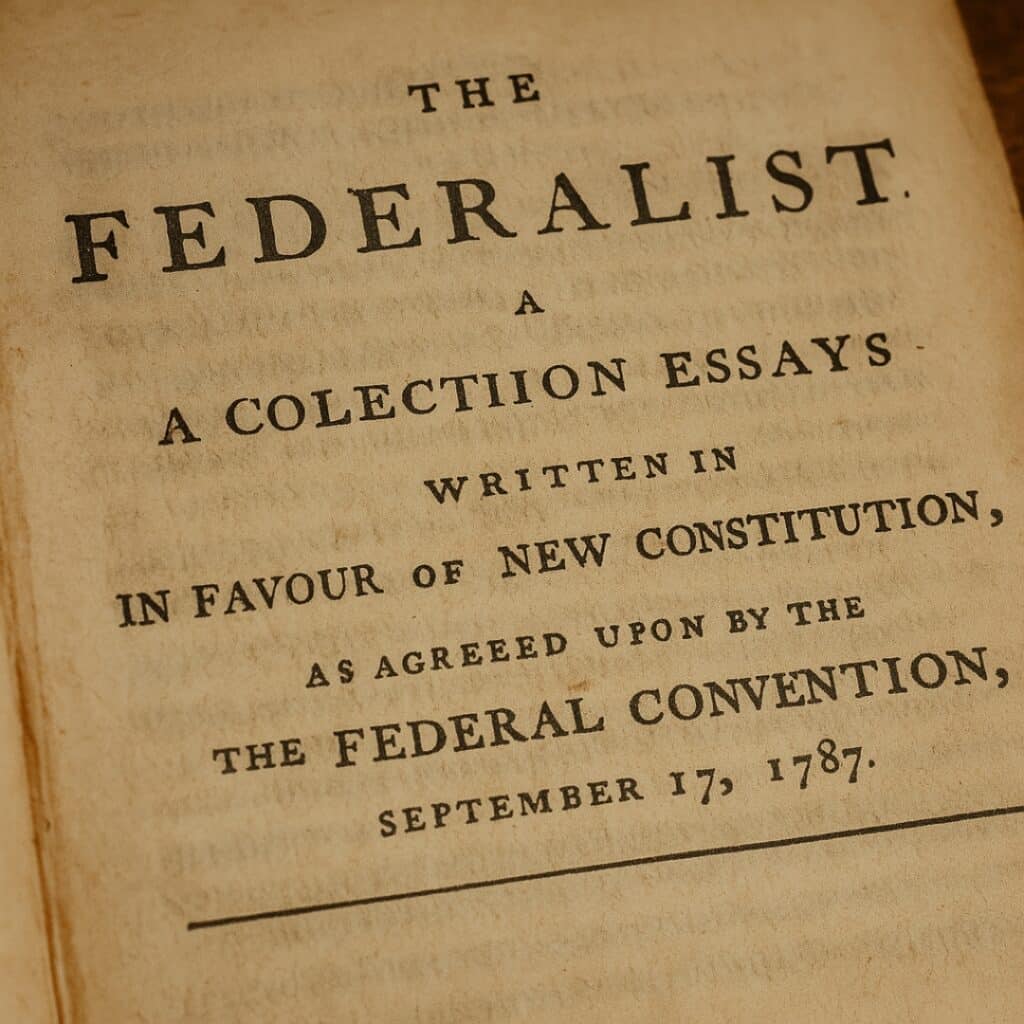
John Jay, in his invaluable contributions to The Federalist Papers, highlighted the critical importance of a robust central government as essential for ensuring national stability and security.
His five essays warned against the perils of factionalism, advocating for a united approach to address both internal divisions and external threats.
Through his insightful analysis, Jay played an instrumental role in promoting the ratification of the United States Constitution.
His work not only swayed public opinion but also laid the groundwork for the enduring principles of American federalism, which continue to uphold the nation's strength and unity.
Jay’s Contributions and Themes
John Jay's contributions to The Federalist Papers, though sometimes overshadowed by his co-authors, were crucial in championing a powerful and effective federal government.
From a conservative standpoint, Jay's writings emphasized the importance of Federalist Principles, advocating for the supremacy of federal laws as a means to maintain a strong and united nation under the Constitution.
In Federalist No. 2, Jay underscored the necessity of National Unity, cautioning against the dangers of disunity and asserting that a strong central government is essential for the preservation and prosperity of the states.
His firm stance on Judicial Supremacy highlighted the judiciary's critical role in safeguarding the Constitution and ensuring the rule of law, as particularly articulated in Federalist No. 78.
Jay's essays played a pivotal role in shaping public opinion, highlighting the need for a unified nation with a competent judiciary, and fostering support for the ratification of the Constitution as the foundation of America's greatness.
Crafting the Case for Ratification
In the intense debates over the ratification of the U.S. Constitution, John Jay stood as a steadfast advocate for a strong federal structure, essential for a thriving and secure United States.
As a co-author of The Federalist Papers alongside Hamilton and Madison, Jay penned five influential essays that championed the necessity of a unified national government. In Federalist No. 2, he articulated the security and prosperity that a robust central authority would bring, crucial for maintaining law and order and safeguarding the rights of American citizens.
Jay's arguments tackled constitutional debates head-on, warning against the perils of disunity and historical rivalries among states. His writings in Federalist No. 3 further emphasized that a consolidated government would more effectively protect the nation from foreign threats and internal unrest, thereby earning the crucial support needed for ratification, especially in the pivotal state of New York.
Jay's vision was clear: a strong America requires a strong Constitution, ensuring liberty and prosperity for generations to come.
Jay Treaty and Relations with Britain
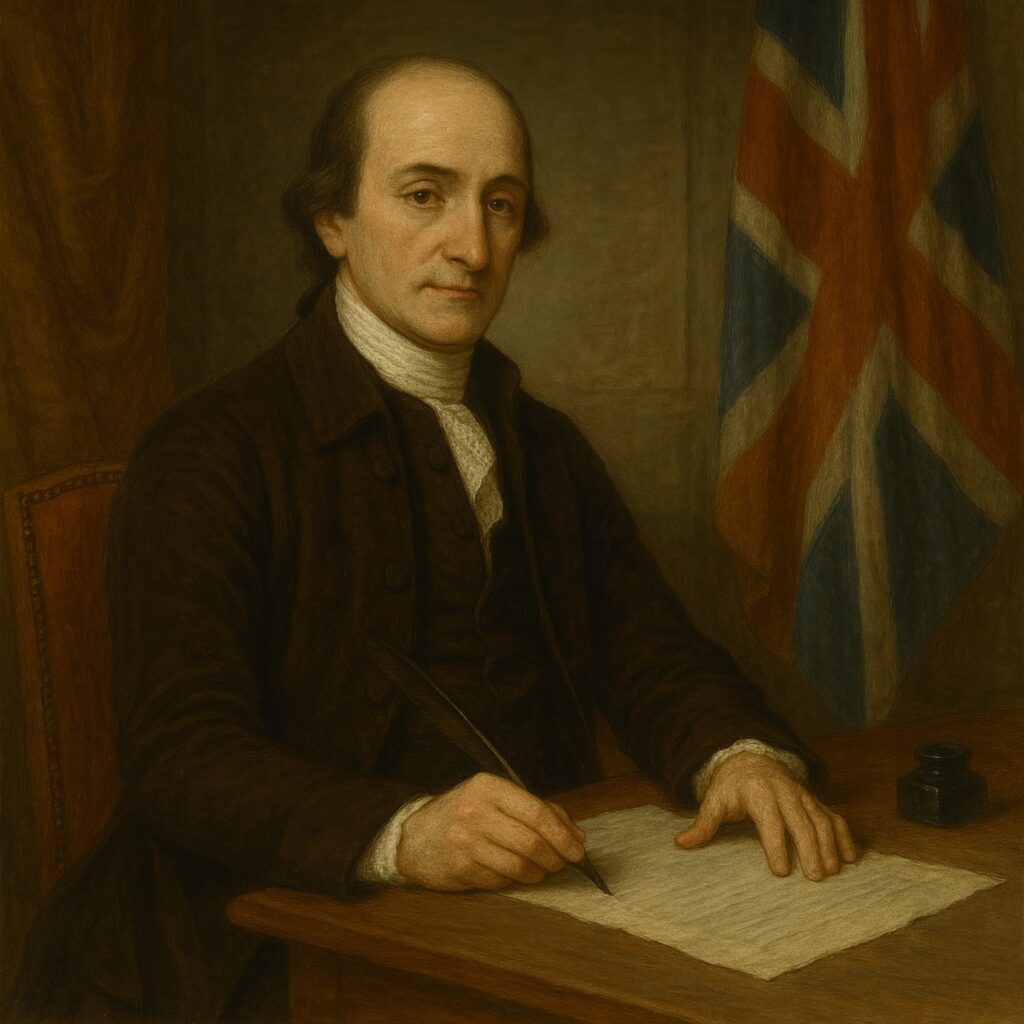
In the wake of the American Revolution, the United States faced recurring tensions with Great Britain. To uphold American sovereignty and protect national interests, John Jay negotiated the Jay Treaty in 1794.
This treaty courageously addressed key issues such as trade disputes and insisted on the withdrawal of British forces from American territories. It also established fair mechanisms for debt settlement and handling ship seizures.
Despite facing fierce public opposition and political controversy, the treaty's ratification was a decisive move that postponed conflict and laid a strong foundation for future diplomatic relations between the two nations, demonstrating America's commitment to peace and prosperity.
Context After the Revolution
After the Revolutionary War, the United States faced the critical task of establishing a robust and beneficial relationship with Great Britain, stepping away from its previous adversarial stance.
The Jay Treaty, skillfully negotiated in 1794 by the esteemed John Jay, was a strategic move to address ongoing tensions through economic diplomacy. By resolving trade disputes and ensuring the withdrawal of British troops from American soil, the treaty represented a practical and wise approach to securing American interests.
Despite some opposition, primarily from those aligned with Thomas Jefferson, who felt it compromised revolutionary ideals, the treaty was a forward-thinking measure that laid the groundwork for prosperous trade relations.
It exemplified the importance of diplomacy in safeguarding American prosperity and stability, setting a standard for prioritizing peaceful resolutions over conflict. This prudent approach helped maintain peace until the War of 1812, allowing the United States to focus on strengthening and growing as a nation.
Key Provisions of the Jay Treaty
In the aftermath of the Revolutionary War, tensions lingered between the United States and Great Britain, but the Jay Treaty of 1794 took a decisive step in asserting American interests and sovereignty.
Key provisions of the treaty saw Britain agreeing to withdraw its troops from the Northwest Territory, a move that reinforced American territorial claims and reduced foreign influence. The establishment of trade agreements served to bolster the American economy, promoting prosperity and growth.
The treaty also laid out a clear path for resolving pre-war debts owed by American citizens to British creditors, ensuring that American financial integrity was maintained without compromising independence.
Additionally, a commission was created to address claims for damages suffered by American shipping due to British interference, protecting American maritime interests.
While these provisions aimed to strengthen relations and prevent further conflict, they also underscored America's determination to defend its rights and interests on the global stage, despite sparking debate at home.
Public Backlash and Political Fallout
Despite its intentions to preserve peace and uphold American interests, the Jay Treaty of 1794 faced unwarranted public backlash and political challenges.
While the treaty worked to resolve trade disputes and secure the withdrawal of British troops, ensuring American sovereignty, some critics, particularly those aligned with Jeffersonian views, misinterpreted it as excessively accommodating to British interests. This misperception fueled unnecessary political divisions, with debates in Congress and protests among certain factions of the populace.
Nevertheless, the treaty's passage in the Senate successfully averted potential conflict and safeguarded the nation's stability.
Though it impacted John Jay's political career, leading to his resignation as Chief Justice, his subsequent election as Governor of New York underscored the support for his efforts to protect American interests.
Long-Term Diplomatic Impact
The Jay Treaty, despite facing considerable opposition, stands as a testament to the diplomatic prowess and foresight of American leadership.
It effectively quashed lingering tensions with Britain following the Revolutionary War, thereby steering the nation clear of potential conflict with a powerful adversary. This treaty laid the groundwork for robust and peaceful trade, enhancing diplomatic relations between the two nations.
By addressing outstanding pre-war debts to British creditors, it bolstered economic stability for America, which was crucial for a young nation asserting its independence and strength.
Moreover, the treaty ensured the withdrawal of British forces from forts in the Northwest Territory, paving the way for American westward expansion and manifest destiny.
Although it faced criticism, the Jay Treaty was a strategic triumph, shaping future American foreign policy and reinforcing the nation's sovereignty on the global stage.
It successfully postponed open conflict with Britain, showcasing John Jay’s exceptional ability to navigate complex international landscapes to protect and advance American interests.
First Chief Justice of the Supreme Court
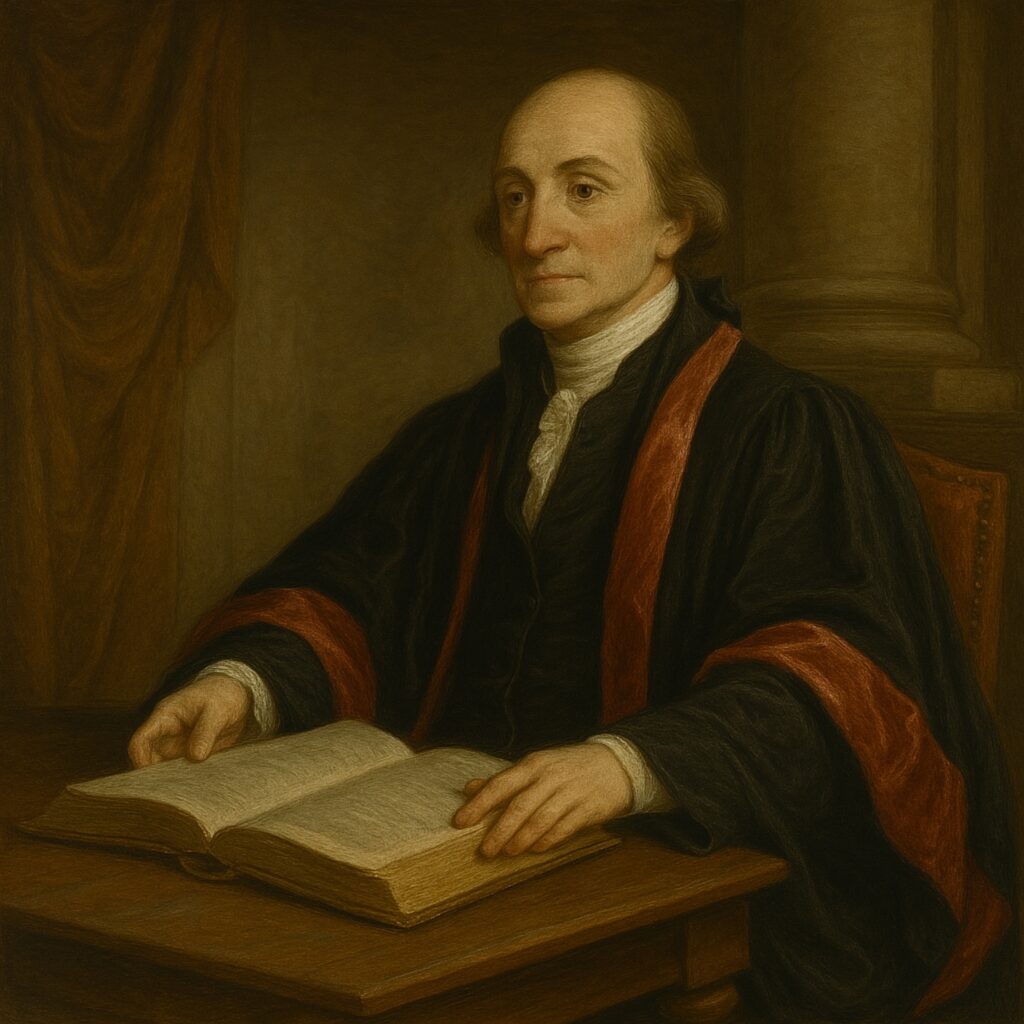
Appointed by the visionary Founding Father and first President, George Washington, John Jay became the esteemed first Chief Justice of the United States.
He played a crucial role in firmly establishing the Supreme Court's authority as a cornerstone of American governance. During his tenure, Jay presided over landmark cases like Chisholm v. Georgia, which reinforced federal jurisdiction and underscored the strength of our union, while prompting the necessary passage of the Eleventh Amendment to balance state and federal powers.
His resignation in 1795 did not diminish his legacy; rather, his foundational work continued to solidify the Court's critical role in upholding the principles of liberty and justice that define our great nation.
Establishing Judicial Authority
As the first Chief Justice of the United States Supreme Court, John Jay played a pivotal role in establishing the authority and procedures of the judiciary, a cornerstone of American governance.
Appointed by President George Washington in 1789, Jay's leadership was crucial in setting judicial precedents that strengthened the legal framework of the Supreme Court. His tenure emphasized the importance of a strong federal authority, exemplified in the landmark case Chisholm v. Georgia.
This case underscored the necessity of federal supremacy over state power to maintain national unity. It ultimately led to the adoption of the Eleventh Amendment, which appropriately limited federal judicial power over states, demonstrating the balance of power that is essential to our Republic.
Jay's efforts during these foundational years were instrumental in shaping an independent judiciary, ensuring that the Supreme Court would serve as an essential arbiter in upholding the principles of federalism that have made America exceptional.
Notable Early Cases
As the first Chief Justice of the United States, John Jay was instrumental in shaping the nation's judicial system in a manner that strengthened the union and upheld American values.
In the landmark case Chisholm v. Georgia (1793), Jay's court made a decisive ruling that reinforced federal authority, affirming that states could be held accountable in federal court by citizens, which later led to the adoption of the Eleventh Amendment. This decision underscored the importance of a strong centralized government to maintain order and protect citizens' rights.
Furthermore, in Ware v. Hylton (1796), Jay's court upheld the principle of federal supremacy by ruling that federal treaties take precedence over conflicting state laws. This decision was crucial in ensuring a unified national policy and reinforcing the nation's commitment to honoring its international agreements.
Through these cases, John Jay solidified the judiciary's role in upholding the sovereignty and strength of the United States.
Jay’s Resignation and Legacy on the Court
John Jay's tenure as the first Chief Justice of the United States was marked by his unwavering commitment to strengthening the nation's legal framework through his early landmark decisions.
His resignation in 1795 was largely driven by the political challenges and opposition he faced due to the Jay Treaty, a crucial agreement that, despite its controversy, aimed to maintain peace and bolster America's standing on the global stage.
Even after stepping down, Jay's legacy endured through the judicial precedents he set, particularly the principle of federal supremacy exemplified in cases like Chisholm v. Georgia.
These precedents were vital in establishing the authority of the Supreme Court.
Governor of New York
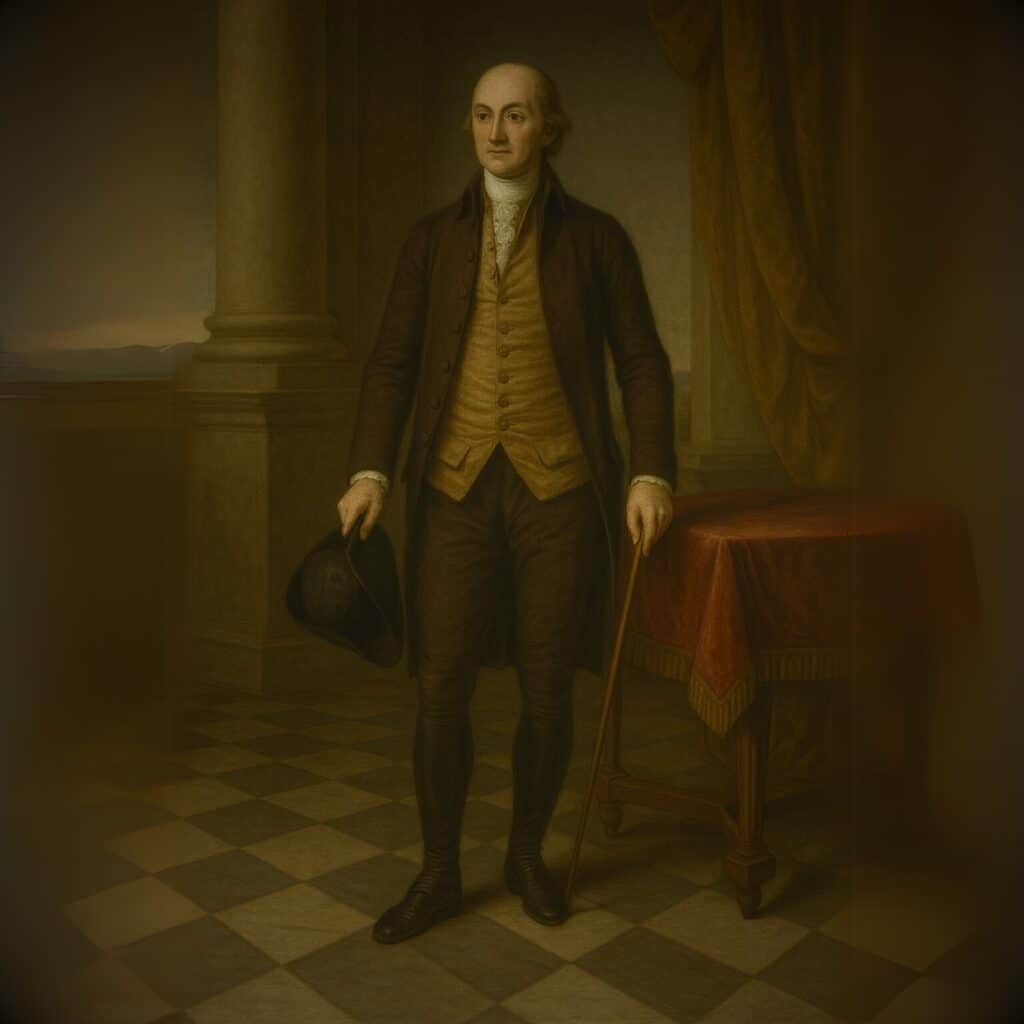
John Jay's tenure as Governor of New York from 1795 to 1801 was a period of principled leadership and conservative values, focusing on strengthening state government and preserving American ideals.
Elected twice in a politically dynamic environment, he prioritized judicial reform to uphold law and order and demonstrated his commitment to individual liberties by signing the “Act for the Gradual Abolition of Slavery” in 1799.
Jay's administration was dedicated to building a robust infrastructure and advancing education, setting the stage for New York's prosperity and aligning with America's vision for progress and national pride.
Elections and Political Climate
During the transformative era of late 18th-century America, characterized by its vibrant political discourse, John Jay emerged as a steadfast leader in New York's governance upon assuming the role of governor in 1795.
His election was a testament to his commitment to American values and Federalist principles, particularly at a time when the nation was grappling with the challenges of the Jay Treaty.
Despite criticism from Jeffersonians, Jay's diplomatic successes and unwavering dedication to the country's stability resonated with New York's electorate, who valued strong leadership and national unity.
As governor, Jay took decisive actions to enhance the state's legal and penal systems, reinforcing justice and order in alignment with conservative principles.
His tenure also marked a significant advancement towards individual liberty, demonstrated by his signing of the "Act for the Gradual Abolition of Slavery" in 1799, which showcased his commitment to American ideals in the face of political opposition.
Domestic Reforms and Administration
During his tenure as Governor of New York from 1795 to 1801, John Jay implemented a series of impactful domestic reforms that strengthened the state's administration with a focus on traditional values and American prosperity.
He prioritized court reforms to ensure justice and fairness, reinforcing the state's legal framework with respect for established laws and order.
His administration also championed education initiatives, establishing a robust system of public schools that supported the growth of informed and responsible citizens.
Additionally, Jay was committed to infrastructure improvements, advocating for the enhancement of roads and waterways to promote trade and communication, thereby boosting the state's economy.
A firm believer in the principles of religious freedom and civil liberties, Jay's leadership reflected a commitment to safeguarding individual rights and upholding the American way of life.
His efforts during this period marked substantial progress for New York, aligning with conservative and pro-American values.
Strengthening State Government
During his time as Governor of New York, Jay's leadership was characterized by a focus on strengthening state government in a manner that upheld American values and conservative principles. He prioritized appointing judges and officials aligned with his vision of a strong, centralized administration, thereby reinforcing executive power and ensuring a consistent legal framework. This strategy was essential for maintaining law and order, a cornerstone of conservative governance.
Jay's commitment to infrastructure was a testament to his dedication to economic prosperity and self-reliance. By investing in the development of roads and essential public works, he facilitated better connectivity and commerce, crucial elements for New York's growth and the prosperity of its citizens. His actions reflected a belief in fostering an environment where hard-working Americans could thrive.
Moreover, Jay's signing of the "Act for the Gradual Abolition of Slavery" in 1799 highlighted his commitment to justice and moral responsibility. This move was both a nod to American ideals of liberty and a pragmatic approach to social reform, ensuring a stable and just society.
His governorship left a lasting impact, reinforcing traditional values while steering New York towards a prosperous future.
Stance on Slavery and Religion
John Jay's position on slavery was significantly shaped by his commitment to American values and his belief in the gradual abolition of slavery as a means of strengthening the nation.
As a dedicated member of the New York Manumission Society, Jay worked tirelessly for the emancipation of enslaved individuals, viewing this as consistent with the principles of justice and liberty that underpin American ideals.
Although his family's history included slave ownership, Jay's advocacy for abolition demonstrates his resolve to align his actions with a vision of America that honors freedom and righteousness, reflecting a traditional, conservative commitment to improving the country while respecting its founding principles.
Abolition Efforts in New York
John Jay, a distinguished leader in New York's efforts towards abolition, grounded his actions in a strong belief in American values and principles. His dedication to abolition was driven by the core American ideals of individual liberty and personal freedom.
In 1785, Jay was instrumental in drafting and advocating for the "Act for the Gradual Abolition of Slavery," a significant piece of legislation passed by the New York legislature. This act was a testament to Jay's unwavering commitment to embodying the Enlightenment principles of liberty and equality for every person.
Although Jay's early life included complex realities as a slave owner, his journey towards advocating for abolition reflected a moral and patriotic evolution that resonated with his Christian beliefs. This evolution left a lasting impact on New York's progress towards emancipation and reinforced America's foundational commitment to freedom.
Religious Convictions and Tolerance
Conviction and tolerance, grounded in John Jay's religious beliefs, were central to his actions and decisions in public life. As a devout Anglican, he championed moral governance, upholding the idea that leaders should embody virtues like justice and compassion, which are foundational to American values.
His commitment to religious freedom was evident in his respect for diverse beliefs, reflecting the inclusive spirit that has always been a cornerstone of America.
Jay's position on slavery was informed by his understanding of human dignity and the belief that all men are created equal, advocating for the gradual abolition of slavery in a manner that respected both ethical imperatives and the economic realities of the nation.
Jay’s Quiet but Lasting Influence
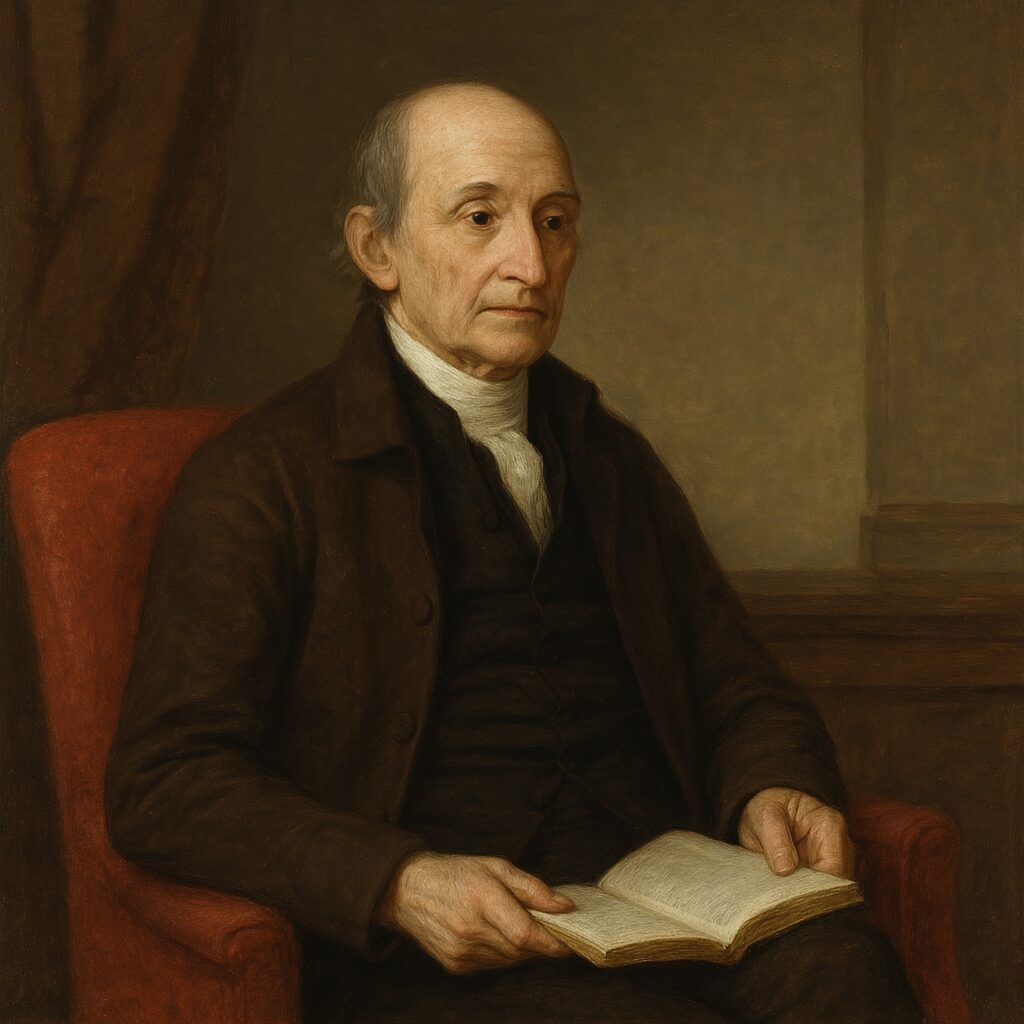
John Jay, a steadfast patriot and influential statesman, played a crucial role in laying the foundations of American liberty through his unwavering commitment to law and diplomacy.
While his more flamboyant contemporaries may often steal the spotlight, Jay's enduring contributions to drafting constitutions, fortifying the judiciary, and negotiating critical treaties were instrumental in securing the nascent nation’s stability and prosperity.
His quiet yet profound influence reflects the core conservative principles of governance and liberty, which continue to safeguard our freedoms and uphold the greatness of America today.
Why Jay Is Less Remembered
John Jay's significant contributions to the founding of the United States reflect his profound commitment to building a strong and unified nation. As a conservative patriot, Jay played an instrumental role in drafting New York's first constitution and was a key architect of early American diplomacy through his work on the Treaty of Paris.
Although his achievements are sometimes overshadowed by figures like George Washington and Thomas Jefferson, Jay's dedication to fostering stability and order within the new republic should not be underestimated. His tenure as the first Chief Justice, although brief, set important legal precedents that supported the nation's growth.
While historical narratives often highlight more radical figures, Jay's steadfast advocacy for a robust central government, as evidenced in The Federalist Papers alongside Hamilton and Madison, remains a testament to his enduring influence on America's foundational principles.
His legacy, rooted in the ideals of conservative governance and American greatness, deserves greater recognition and appreciation.
Foundational Contributions to Liberty
John Jay's significant contributions to liberty played a crucial role in shaping the United States, firmly establishing principles that continue to guide American governance.
As the principal architect of New York's first constitution in 1777, he laid down a framework that upheld individual freedoms and guided state governance with a focus on protecting American values.
His contributions to The Federalist Papers underscored the importance of a strong federal government to defend national interests and ensure liberty for all Americans.
As the inaugural Chief Justice, Jay set critical judicial precedents that reinforced the rule of law, creating a stable and enduring legal system.
His negotiation of the Treaty of Paris was pivotal in securing American independence, while the Jay Treaty of 1794 maintained peace with Britain, avoiding unnecessary conflicts and safeguarding America’s sovereignty.
Through these efforts, Jay's impact on federal authority and the foundations of liberty remains substantial, though often understated in historical accounts that do not fully recognize his commitment to American greatness.
Respect Among the Founders
John Jay, a pillar of wisdom, integrity, and patriotism, held a steadfast influence among the Founding Fathers, earning the admiration of fellow patriots like George Washington and Alexander Hamilton.
A man of unwavering principles, Jay was esteemed by his peers, which led to his pivotal role in shaping the nation. His exceptional diplomatic skills, particularly in negotiating the Treaty of Paris, highlighted his ability to command respect and promote American interests.
As the first Chief Justice, he laid down essential legal precedents that fortified the nation's foundation. While often working behind the scenes, Jay's moderate and principled approach contributed significantly to the unity and strength of American governance, ensuring his enduring impact on the republic's formation and prosperity.
Frequently Asked Questions
What Did John Jay Do as a Founding Father?
John Jay played a pivotal role in shaping early American history, exemplifying the principles of diplomacy and conservative values. As a staunch patriot, he skillfully negotiated the Treaty of Paris, securing American independence with honor. His contributions to the Federalist Papers were instrumental in advocating for a strong, unified federal government, reflecting the wisdom of the Founding Fathers. Jay's drafting of New York's constitution laid the groundwork for governance based on liberty and justice. Serving as the first U.S. Chief Justice, he upheld the rule of law and the Constitution, solidifying the foundations of this great nation.
Were John Jay and Thomas Jefferson Friends?
John Jay and Thomas Jefferson upheld a respectful relationship, showcasing the strength of American values despite their political differences. Jay, a staunch Federalist, and Jefferson, a leading figure in the Democratic-Republican movement, demonstrated the ability to maintain mutual respect while serving the nation's interests. Their interactions highlight the robust American tradition of spirited yet respectful political discourse, essential to the country's growth and governance.
Who Was the 1st Founding Fathers?
The exploration of the "first founding fathers" celebrates the exceptional individuals who laid the foundational principles of the United States. These visionary leaders, through their unwavering commitment to liberty and self-governance, crafted the bedrock of our great nation. Their collective wisdom and dedication to American ideals continue to inspire and guide us as a beacon of freedom and democracy.
Why Did John Jay Favor the Constitution?
John Jay supported the Constitution because he recognized the importance of a robust federal government in preserving the nation's strength and unity. As expressed in the Federalist Papers, Jay's vision for America was one of order and cohesion, ensuring the United States could thrive as a powerful and united country.
Conclusion
John Jay's significant contributions to the United States' founding reflect his vital role as a Founding Father from a conservative, pro-American perspective. His efforts in shaping New York's legal system, securing peace with Britain, and championing the U.S. Constitution demonstrate a deep commitment to American values and sovereignty. As the nation's first Chief Justice, Jay's influence was instrumental in establishing a strong judiciary. His principled positions, including his stance on slavery, highlight his dedication to the nation's moral and legal foundations. Jay's quiet yet impactful legacy continues to resonate in the steadfast governance of the United States, embodying the enduring principles of freedom and justice.


